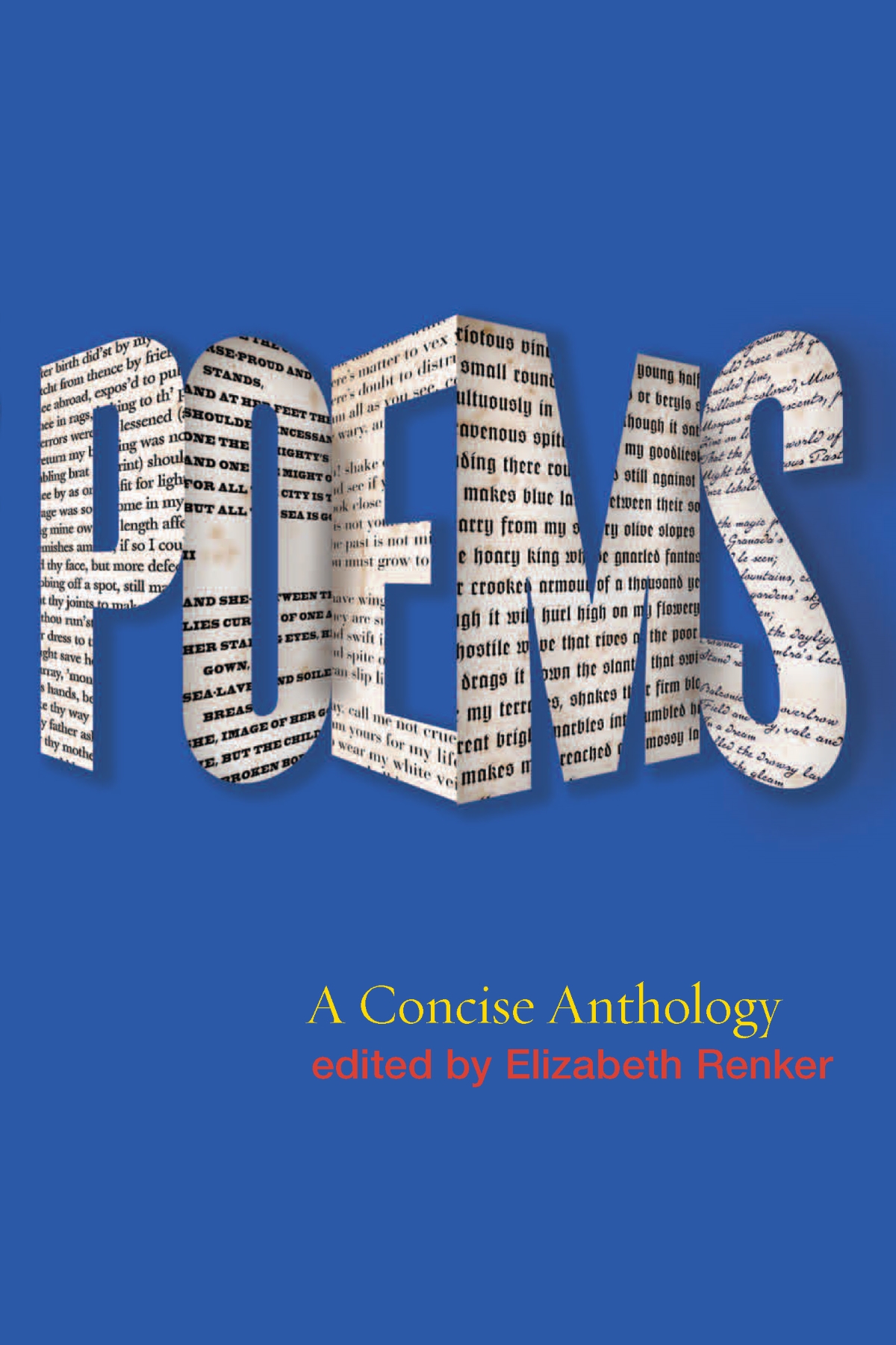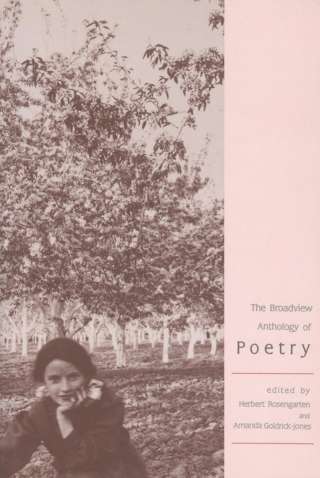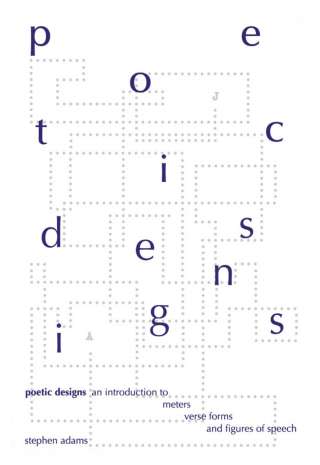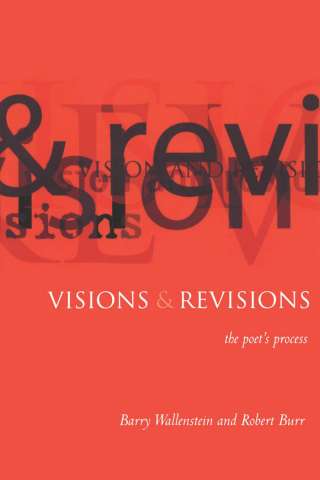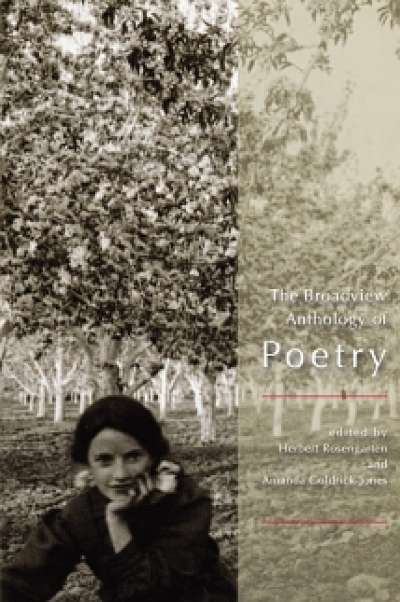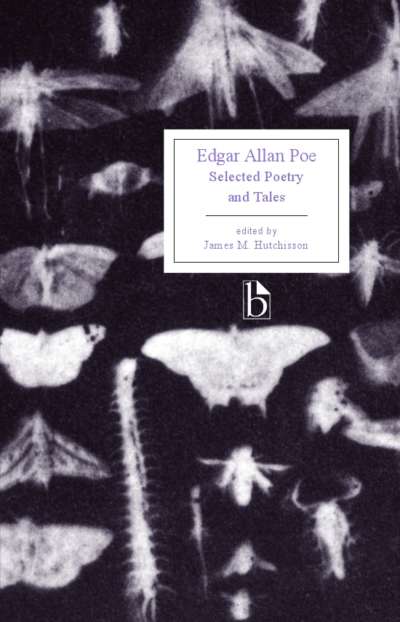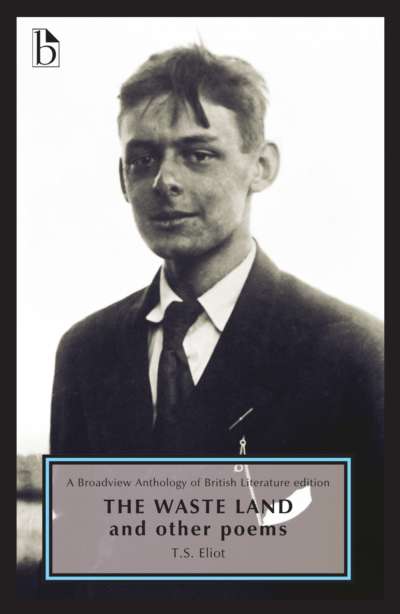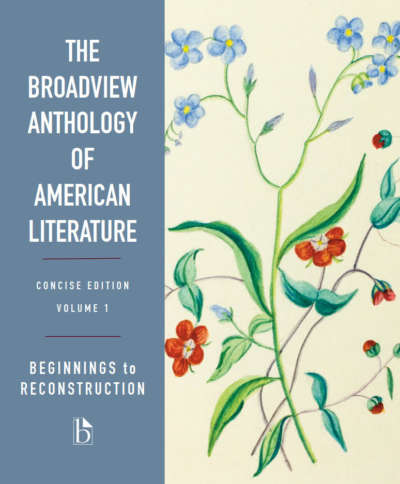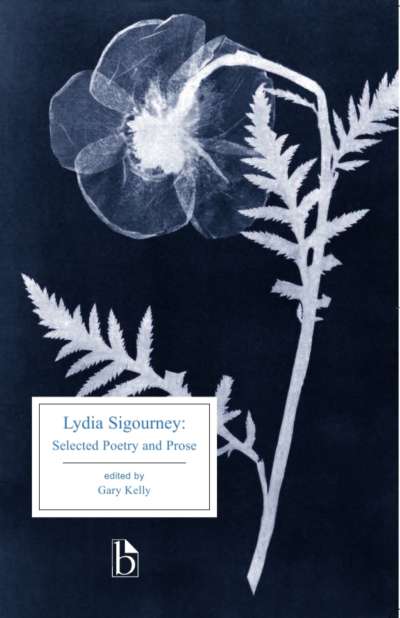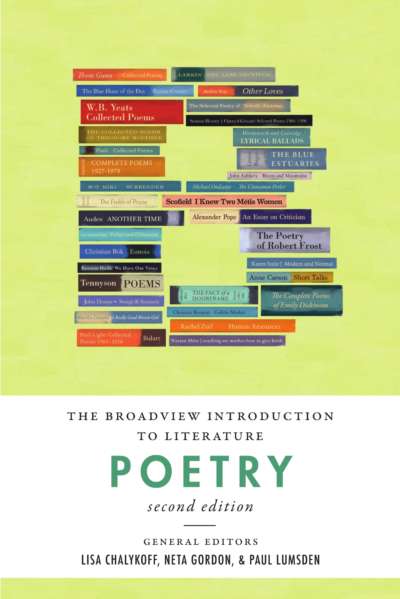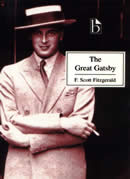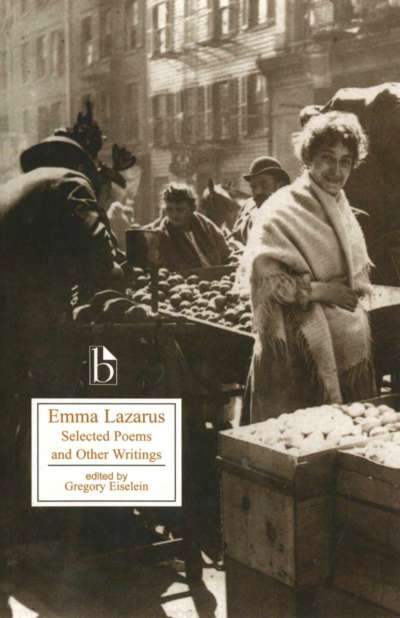This book can be purchased on its own or in a discounted package with access to the How Poems Work website. If you wish to order the package, please contact us at Customer Service or place the order through your bookstore using ISBN 1-4881-0270-8 / 978-1-4881-0270-7.
Presenting a broad range of fully annotated selections from the long history of poetry in English, this anthology provides a rich and extensive resource for teaching traditional canons and forms as well as experimental and alternate trajectories (such as Language poetry and prose poetry). In addition to a chronological table of contents suited to a literary-historical course framework, the volume offers a list of conceptual and thematic teaching units called “Poems in Conversation.” Instructors will find the Conversations helpful for lesson plans; students will find them equally helpful as a resource for presentation and paper topics. Headnotes to each poet are designed to be useful to both instructors and students in the classroom: for instructors new to particular poets, the headnotes will provide helpful grounding in the most current scholarship; for students, they will provide frameworks and explanations to help them approach unfamiliar texts.
As a unique feature in the current market, this anthology also incorporates contemporary song lyrics from alternative, indie, rap, and hip-hop songs, fully integrated into the Conversations as rich material for teaching in the undergraduate classroom.
Comments
“Reflecting contemporary interest in transnational connections, Elizabeth Renker’s comprehensive anthology will foster enlivened pedagogy; the volume is enhanced by its alternative table of contents, tactfully informative headnotes, and web-based supplementary readings. Thematic emphases such as love and self-discovery will especially appeal to students. Poems simultaneously invites and challenges readers, encompassing familiar selections by established poets, thought-provoking contributions by newcomers, widely varying forms, and diverse authors. Anyone who teaches poetry—or simply loves it—will appreciate the anthology’s multiple pleasures and opportunities.” — Karen L. Kilcup, University of North Carolina at Greensboro
“Poems: A Concise Anthology is truly concise, covering over one thousand years of poetry in English in a single volume. It is also remarkably capacious, offering selections from a wide array of poets. Alongside canonical writers from Chaucer to Emily Dickinson to Seamus Heaney, the editor has included recently recovered work by women and African American writers. Popular songs make up part of the selection. A substantial selection of poetry by writers working today are included. The headnotes are succinct and well-informed. Glosses of unfamiliar words and spare but necessary notes help without bogging down the reader. The broad array of materials offers maximum flexibility to instructors in syllabus design. This book provides everything necessary for introductory poetry classes and undergraduate poetry classes more generally. It will be a pleasure to use for both students and instructors.” — Eliza Richards, University of North Carolina at Chapel Hill
“[I] enjoyed looking over the text and marveling at the selections.”— Mira Foote, Community College of Carroll County
“How often does a volume of poems that surveys centuries of its finest instances enable a professor to rethink her or his syllabus from top to bottom? Poems: A Concise Anthology inspired me to revitalize a course that was becoming predictable. I know of no other comparable textbook that offers a teacher a chance to draw upon the most resonant examples of canonical poetry, and simultaneously engenders discussions of the social roles that poetry might play in mobilizing literate communities still in a formative stage. Elizabeth Renker’s astute editorial touch honors the metrical tradition, even as she expands the ground conditions of material and popular culture for lyrical praxis. Its survey of practitioners of avant-garde practitioners, in particular, usefully goes beyond mere token recognition and enables my current syllabus to recognize the full amplitude of contemporary poetry.” — Bill Mohr, Professor, California State University, Long Beach
POEMS IN CONVERSATION
ACKNOWLEDGEMENTS
CONTRIBUTORS
NOTE TO READERS
- THE EXETER BOOK (C. 970–1000 CE)
- “The Wife’s Lament”
- Riddle 23
Riddle 33
Riddle 81
- GEOFFREY CHAUCER (C. 1343–1400)
- SIR THOMAS WYATT (C. 1503–42)
- [“The long love that in my thought doth harbour”]
[“Whoso list to hunt, I know where is an hind”]
- EDMUND SPENSER (1552?–99)
- from Amoretti
- 1 [“Happy ye leaves when as those lilly hands”]
75 [“One day I wrote her name upon the strand”]
- SIR WALTER RALEGH (1554–1618)
- “The Nymph’s Reply to the Shepherd”
- CHRISTOPHER MARLOWE (1564–93)
- “The Passionate Shepherd to His Love”
- WILLIAM SHAKESPEARE (1564–1616)
- 18 [“Shall I compare thee to a summer’s day?”]
29 [“When in disgrace with fortune and men’s eyes”]
73 [“That time of year thou mayst in me behold”]
116 [“Let me not to the marriage of true minds”]
130 [“My mistress’ eyes are nothing like the sun”]
- THOMAS CAMPION (1567–1620)
- [“There is a garden in her face”]
- THOMAS NASHE (1567–1601?)
- “A Litany In Time of Plague”
- JOHN DONNE (1572–1631)
- “The Flea”
“The Good-Morrow”
from Holy Sonnets
- 10 [“Death be not proud, though some have called thee”]
14 [“Batter my heart, three personed God; for you”]
- “A Valediction: Forbidding Mourning”
- LADY MARY WROTH (1587–1653?)
from Pamphilia to Amphilanthus
- Song [“Love, a child, is ever crying”]
77 [“In this strange labyrinth how shall I turn?”]
- ROBERT HERRICK (1591–1674)
- “Delight in Disorder”
“To the Virgins, to Make Much of Time”
- GEORGE HERBERT (1593–1633)
- “The Collar”
“The Altar”
“Easter Wings”
- JOHN MILTON (1608–74)
- “How Soon Hath Time”
“On Shakespeare”
[“When I consider how my light is spent”]
“Lycidas” [website]
- ANNE BRADSTREET (1612–72)
- “The Author to Her Book”
“Before the Birth of One of Her Children”
“Here Follows Some Verses upon the Burning of Our House”
- ANDREW MARVELL (1621–78)
- “The Garden”
“To His Coy Mistress”
- ALEXANDER POPE (1688–1744)
- “The Rape of the Lock” [website]
- THOMAS GRAY (1716–71)
- “Elegy Written in a Country Churchyard”
- CHARLOTTE SMITH (1749–1806)
- from Elegiac Sonnets
- LXX [“On Being Cautioned Against Walking on a Headland Overlooking the Sea, Because It Was Frequented by a Lunatic”]
- PHILLIS WHEATLEY (1753–84)
- “To the Right Honorable William, Earl of Dartmouth”
“On Being Brought from Africa to America”
- WILLIAM BLAKE (1757–1827)
- from Songs of Innocence
- “The Lamb”
“The Chimney Sweeper”
- from Songs of Experience
- “The Chimney Sweeper”
“The Sick Rose”
“The Tyger”
“London”
- WILLIAM WORDSWORTH (1770–1850)
- “Lines Written a Few Miles above Tintern Abbey”
“She dwelt among the untrodden ways”
“A slumber did my spirit seal”
“Strange fits of passion have I known”
“Three years she grew in sun and shower”
“I travelled among unknown men”
“London, 1802”
“Nuns fret not at their convent’s narrow room”
- DOROTHY WORDSWORTH (1771–1855)
- SAMUEL TAYLOR COLERIDGE (1772–1834)
- “The Eolian Harp”
“Frost at Midnight”
“Kubla Khan”
- LYDIA SIGOURNEY (1791–1865)
- “Death of an Infant”
“To the First Slave Ship”
“The Indian’s Welcome to the Pilgrim Fathers”
- PERCY BYSSHE SHELLEY (1792–1822)
- “Ozymandias”
“Ode to the West Wind”
“To A Skylark”
“Mont Blanc” [website]
- WILLIAM CULLEN BRYANT (1794–1878)
- “The Prairies”
“To a Waterfowl”
- JOHN KEATS (1795–1821)
- “Ode to a Nightingale”
“Ode on a Grecian Urn”
“To Autumn”
“La Belle Dame Sans Merci”
“When I Have Fears that I May Cease to Be”
- RALPH WALDO EMERSON (1803–82)
- “Fate”
“Maiden Speech of the Aeolian Harp”
- ELIZABETH BARRETT BROWNING (1806–61)
- from Sonnets from the Portuguese
- 22 [“When our two souls stand up erect and strong”]
24 [“Let the world’s sharpness like a clasping knife”]
43 [“How do I love thee? Let me count the ways”]
- from Aurora Leigh, Book I
- HENRY WADSWORTH LONGFELLOW (1807–82)
- “The Spirit of Poetry”
“The Quadroon Girl”
“The Slave Singing at Midnight”
“The City and the Sea”
- JOHN GREENLEAF WHITTIER (1807–92)
- EDGAR ALLAN POE (1809–49)
- “Sonnet—To Science”
“To Helen”
“The City in the Sea”
“The Raven”
“The Sleeper”
“Annabel Lee”
- ALFRED LORD TENNYSON (1809–92)
- “Mariana”
“The Lady of Shalott”
“St. Simeon Stylites” [website]
“Ulysses”
“The Charge of the Light Brigade”
“In Memoriam A.H.H.” [website]
- FRANCES SARGENT OSGOOD (1811–50)
- [“Won’t you die & be a spirit”]
“To My Pen”
“The Coquette’s Vow”
- ROBERT BROWNING (1812–89)
- “Porphyria’s Lover”
“My Last Duchess”
- EMILY BRONTË (1818–48)
- [“No coward soul is mine”]
[“Often rebuked, yet always back returning”]
[“I’ll come when thou art saddest”]
- HERMAN MELVILLE (1819–91)
- “Ball’s Bluff”
“Dupont’s Round Fight”
“A Utilitarian View of the Monitor’s Fight”
“The Æolian Harp”
“Pebbles”
“Field Asters”
- WALT WHITMAN (1819–92)
- “A Glimpse”
“To A Stranger”
“Come Up from the Fields Father”
“When I Heard the Learn’d Astronomer”
“Crossing Brooklyn Ferry”
“Song of Myself” [website]
“When Lilacs Last in the Dooryard Bloom’d” [website]
- ALICE CARY (1820–71)
- FREDERICK GODDARD TUCKERMAN (1821–73)
- Sonnet VII, Second Series [“His heart was in his garden; but his brain”]
- MATTHEW ARNOLD (1822–88)
- JAMES MONROE WHITFIELD (1822–71)
- FRANCES E.W. HARPER (1825–1911)
- “The Slave Auction”
“Bible Defense of Slavery”
“Learning to Read”
“A Double Standard”
- ROSE TERRY (COOKE) (1827–92)
- “Arachne”
“Blue-Beard’s Closet”
“Fantasia”
“Truths”
- DANTE GABRIEL ROSSETTI (1828–82)
- EMILY DICKINSON (1830–86)
- 134 [“Did the Harebell loose her girdle”]
310 [“‘Heaven’ – is what I cannot reach!”] [website]
320 [“There’s a certain slant of light”]
423 [“The first Day’s Night had come”]
446 [“This was a Poet”]
465 [“The name – of it – is ‘Autumn’”]
524 [“It feels a shame to be alive”]
704 [“My portion is Defeat – today”]
857 [“She rose to His Requirement – dropt”]
- CHRISTINA ROSSETTI (1830–94)
- “Goblin Market”
“Cobwebs”
“In an Artist’s Studio”
- SARAH MORGAN BRYAN PIATT (1836–1919)
- “The Funeral of a Doll”
“Mock Diamonds”
“The Palace-Burner”
“Her Blindness in Grief”
“The First Party”
“In Primrose-Time (Early Spring in Ireland)”
- WILLIAM DEAN HOWELLS (1837–1920)
- “The King Dines”
“Society”
- AUGUSTA WEBSTER (1837–94)
- THOMAS HARDY (1840–1928)
- “The Darkling Thrush”
“The Convergence of the Twain”
“During Wind and Rain”
- GERARD MANLEY HOPKINS (1844–89)
- “God’s Grandeur”
“The Windhover”
- EMMA LAZARUS (1849–87)
- “Arabesque”
“By the Waters of Babylon”
“The South” [website]
- SLAVE SONGS/SORROW SONGS (C. 1850)
- “Blow Your Trumpet, Gabriel”
“Poor Rosy”
“Come Go With Me”
“The Hypocrite and the Concubine”
- ELLA WHEELER [WILCOX] (1850–1919)
- A.E. HOUSMAN (1859–1936)
- “Terence, This Is Stupid Stuff”
- E. PAULINE JOHNSON (1861–1913)
- “The Cattle Thief”
“The City and the Sea”
- W.B. YEATS (1865–1939)
- “Easter 1916”
“The Second Coming”
“Leda and the Swan”
“Sailing to Byzantium”
- EDWIN ARLINGTON ROBINSON (1869–1935)
- “The House on the Hill”
“Sonnet [Oh, for a poet—for a beacon bright]
“Walt Whitman”
“Fleming Helphenstine”
“John Evereldown”
“Richard Cory”
- STEPHEN CRANE (1871–1900)
- from The Black Riders
- XIX [“A GOD IN WRATH”]
XX [“A LEARNED MAN CAME TO ME ONCE”]
XXVII [“A YOUTH IN APPAREL THAT GLITTERED”]
LXI [“THERE WAS A MAN AND A WOMAN/WHO SINNED”]
LXVII [“GOD LAY DEAD IN HEAVEN”]
- from War is Kind
- [“The trees in the garden rained flowers”]
[“When the prophet, a complacent fat man”]
- PAUL LAURENCE DUNBAR (1872–1906)
- “We Wear the Mask”
“A Banjo Song”
“The Colored Soldiers”
“A Corn-Song”
- ROBERT FROST (1874–1963)
- “Birches”
“Out, Out—”
“The Oven Bird”
“Desert Places”
- AMY LOWELL (1874–1925)
- GERTRUDE STEIN (1874–1946)
- from Tender Buttons
from Patriarchal Poetry [website]
- CARL SANDBURG (1878–1967)
- WALLACE STEVENS (1879–1955)
- “Thirteen Ways of Looking at a Blackbird”
“Nuances of a Theme by Williams”
“The Snow Man”
“Sunday Morning”
“The Poem that Took the Place of a Mountain”
- MINA LOY (1882–1966)
- from Songs to Joannes
- XII [”Voices break on the confines of passion“]
- “The Song of the Nightingale is Like the Scent of Syringa” [website]
- WILLIAM CARLOS WILLIAMS (1883–1963)
- “El Hombre”
“The Red Wheelbarrow”
“Spring and All”
“To Elsie”
“This Is Just to Say”
“Landscape with the Fall of Icarus”
- EZRA POUND (1885–1972)
- “The River-Merchant’s Wife: A Letter”
“In a Station of the Metro”
“A Pact”
“Hugh Selwyn Mauberly/Life and Contacts” [website]
- H.D. (1886–1961)
- ROBINSON JEFFERS (1887–1962)
- MARIANNE MOORE (1887–1972)
- T.S. ELIOT (1888–1965)
- “The Love Song of J. Alfred Prufrock”
“The Hollow Men”
“Journey of the Magi”
“The Waste Land” [website]
- CLAUDE MCKAY (1889–1948)
- EDNA ST. VINCENT MILLAY (1892–1950)
- [“I, being born a woman and distressed”]
[“What lips my lips have kissed, and where, and why”]
“I Too beneath Your Moon, Almighty Sex”
- WILFRED OWEN (1893–1918)
- “Anthem for Doomed Youth”
“Dulce et Decorum Est”
- DOROTHY PARKER (1893–1967)
- “The Passionate Freudian to His Love”
- E.E. CUMMINGS (1894–1962)
- [“i like my body when it is with your”]
[“in Just-”]
[“the Cambridge ladies who live in furnished souls”]
[“may i feel said he”]
[“l(a”]
- HART CRANE (1899–1932)
- “My Grandmother’s Love Letters”
“Recitative”
“At Melville’s Tomb”
- ERNEST HEMINGWAY (1899–1961)
- STERLING A. BROWN (1901–89)
- “Harlem Happiness”
“Bitter Fruit of the Tree”
- LANGSTON HUGHES (1902–67)
- “The Negro Speaks of Rivers”
“The Weary Blues”
“Harlem (2)”
from Montage of a Dream Deferred
- “Low to High”
“High to Low”
“Shame on You”
“World War II”
- STEVIE SMITH (1902–71)
- “Not Waving but Drowning”
“Thoughts about the Person from Porlock”
- COUNTEE CULLEN (1903–46)
- “Yet Do I Marvel”
“From the Dark Tower”
- LORINE NIEDECKER (1903–70)
- LOUIS ZUKOFSKY (1904–78)
- JOHN BETJEMAN (1906–84)
- W.H. AUDEN (1907–73)
- “Funeral Blues”
“Musée des Beaux Arts”
“September 1, 1939”
“The Unknown Citizen”
- GEORGE OPPEN (1908–84)
- “Psalm”
“The Forms of Love”
“Latitude, Longitude”
- THEODORE ROETHKE (1908–63)
- “My Papa’s Waltz”
“Root Cellar”
“I Knew a Woman”
- CHARLES OLSON (1910–70)
- “As the Dead Prey Upon Us”
“Rufus Woodpecker …”
- ELIZABETH BISHOP (1911–79)
- “Casabianca”
“Chemin de Fer”
“First Death in Nova Scotia”
“One Art”
- ROBERT HAYDEN (1913–80)
- “Those Winter Sundays”
“Full Moon”
- RANDALL JARRELL (1914–65)
- “The Death of the Ball Turret Gunner”
- WELDON KEES (1914–55)
- “Sestina: Travel Notes”
“Robinson”
from Five Villanelles
- I [“The crack is moving down the wall”]
- “Aspects of Robinson”
“Robinson at Home”
“Relating to Robinson”
- WILLIAM STAFFORD (1914–93)
- “Traveling through the Dark”
“Fifteen”
“Ask Me”
- DYLAN THOMAS (1914–53)
- “The Force That Through the Green Fuse Drives the Flower”
“Fern Hill”
“Do Not Go Gentle into That Good Night”
- GWENDOLYN BROOKS (1917–2000)
- “We Real Cool”
“Medgar Evers”
- ROBERT LOWELL (1917–1977)
- “Skunk Hour”
“For the Union Dead”
- LAWRENCE FERLINGHETTI (B. 1919)
- JACK KEROUAC (1922–69)
- from Mexico City Blues
- 66th Chorus
67th Chorus
108th Chorus
156th Chorus
- PHILIP LARKIN (1922–85)
- “Church Going”
“Talking in Bed”
“This Be the Verse”
“The Old Fools”
- DENISE LEVERTOV (1923–97)
- “What Were They Like?”
“The Day the Audience Walked Out on Me, and Why”
- JACK GILBERT (1925–2012)
- “The Abnormal is Not Courage”
- “The Forgotten Dialect of the Heart”
“Tear It Down”
- DONALD JUSTICE (1925–2004)
- “Sestina on Six Words by Weldon Kees”
- KENNETH KOCH (1925–2002)
- “Variations on a Theme by William Carlos Williams”
“One Train May Hide Another”
“Mountain”
- ROBERT CREELEY (1926–2005)
- “The Language”
“The Pattern”
“America”
“Anger” [website]
- ALLEN GINSBERG (1926–97)
- “A Supermarket in California”
“Howl” [website]
- FRANK O’HARA (1926–66)
- “A Step Away From Them”
“Why I Am Not a Painter”
- MAYA ANGELOU (1928–2014)
- PHILIP LEVINE (1928–2015)
- “Animals are Passing from Our Lives”
- ANNE SEXTON (1928–74)
- “Sylvia’s Death”
“The Ballad of the Lonely Masturbator”
- THOM GUNN (1929–2004)
- “To His Cynical Mistress”
“In Time of Plague”
“The Hug”
- JOHN HOLLANDER (1929–2013)
- from Thirteens
- 1 [“Triskaidekaphobia through the centuries”]
- “An Old-Fashioned Song”
“Dead Animals”
- ADRIENNE RICH (1929–2012)
- “Aunt Jennifer’s Tigers”
“Living in Sin”
“A Valediction Forbidding Mourning”
“Diving into the Wreck”
- GREGORY CORSO (1930–2001)
- TED HUGHES (1930–98)
- MILLER WILLIAMS (1930–2015)
- “The Shrinking Lonesome Sestina”
“Compassion”
- SYLVIA PLATH (1932–63)
- “Mushrooms”
“Ariel”
“Daddy”
“Lady Lazarus”
- AMIRI BARAKA (1934–2014)
- “I Substitute for the Dead Lecturer”
“Three Modes of History and Culture”
- TED BERRIGAN (1934–1983)
- AUDRE LORDE (1934–1992)
- LUCILLE CLIFTON (1936–2010)
- “miss rosie”
“homage to my hips”
“the lost baby poem”
“wishes for sons”
- SEAMUS HEANEY (1939–2013)
- “Digging”
“Mid-Term Break”
“The Grauballe Man”
“Cutaways”
- STAN RICE (1942–2002)
- AGHA SHAHID ALI (1949–2001)
- “Postcard from Kashmir”
“The Wolf’s Postscript to ‘Little Red Riding Hood’”
- JIM CARROLL (1949–2009)
- “People Who Died”
“To the Secret Poets of Kansas”
“Highway Report (for Jack Kerouac)”
- DEBORAH DIGGES (1950–2009)
- “The Wind Blows through the Door of My Heart”
CONTEMPORARY VOICES
- JOHN ASHBERY (B. 1927)
- “Soonest Mended”
“Paradoxes and Oxymorons”
- GARY SNYDER (B. 1930)
- DEREK WALCOTT (1930)
- “A Far Cry from Africa”
“The Sea is History”
- MARY OLIVER (B. 1935)
- “Death at a Great Distance”
“What Is It?”
- MICHAEL S. HARPER (1938)
- MARGARET ATWOOD (B. 1939)
- “Death of a Young Son by Drowning”
- BILLY COLLINS (B. 1941)
- “Lines Composed Over Three Thousand Miles from Tintern Abbey”
- STEPHEN DOBYNS (B. 1941)
- ROBERT HASS (B. 1941)
- MARILYN HACKER (B. 1942)
- “Villanelle for D.G.B”
[“Didn’t Sappho say her guts clutched up like this?”]
- SHARON OLDS (B. 1942)
- “Sex Without Love”
“The Healers”
- LOUISE GLÜCK (B. 1943)
- EAVAN BOLAND (B. 1944)
- “The Emigrant Irish”
“On the Gift of ’The Birds of America’ by John James Audobon”
- GAIL WHITE (B. 1945)
- PAUL HOOVER (B. 1946)
- “Poems We Can Understand”
- MARILYN NELSON (B. 1946)
- PATTI SMITH (B. 1946)
- “piss factory”
“ps/alm 23 revisited”
- YUSEF KOMUNYAKAA (B. 1947)
- “Facing It”
“Blue Light Lounge Sutra For The Performance Poets At Harold Park Hotel”
- DIANE ACKERMAN (B. 1948)
- “Sweep Me through Your Many-Chambered Heart”
- DAVID LEHMAN (B. 1948)
- “The Difference Between Pepsi and Coke”
“First Offense”
- LYNN EMANUEL (B. 1949)
- ANNE CARSON (B. 1950)
- “On Sylvia Plath”
“Audubon”
- DANA GIOIA (B. 1950)
- “Thanks for Remembering Us”
“Planting a Sequoia”
- ANDREW HUDGINS (B. 1951)
- “At Chancellorsville: The Battle of the Wilderness”
“November Garden: An Elegy”
- RITA DOVE (B. 1952)
- MARY RUEFLE (B. 1952)
- “Why I am Not a Good Kisser”
- MARK DOTY (B. 1953)
- “Charlie Howard’s Descent”
- GJERTRUD SCHNACKENBERG (B. 1953)
- KIM ADDONIZIO (B. 1954)
- LOUISE ERDRICH (B. 1954)
- “Dear John Wayne”
“Indian Boarding School: The Runaways”
- CAROL ANN DUFFY (B. 1955)
- “Little Red Cap”
“Salome”
- PATRICIA SMITH (B. 1955)
- LI-YOUNG LEE (B. 1957)
- KATHY FAGAN (B. 1958)
- JACKIE KAY (B. 1961)
- OLENA KALYTIAK DAVIS (B. 1963)
- “The Lyric ‘I’ Drives to Pick Up Her Children from School: A Poem in the Postconfessional Mode”
- SHERMAN ALEXIE (B. 1966)
- “After the Trial of Hamlet, Chicago, 1994”
- TERRANCE HAYES (B. 1971)
LANGUAGE POETS
- JACKSON MAC LOW (1922–2004)
- “Is That Wool Hat My Hat?” [complete poem on website]
“Daily Life”
- LYN HEJINIAN (B. 1941)
- from Writing is an Aid to Memory
- 28 [“we are parting with description”]
- MICHAEL PALMER (B. 1943)
- MICHAEL DAVIDSON (B. 1944)
- RON SILLIMAN (B. 1946)
- from The Chinese Notebook
- RAE ARMANTROUT (B. 1947)
- CHARLES BERNSTEIN (B. 1950)
- HARRYETTE MULLEN (B. 1953)
- KENNETH GOLDSMITH (B. 1961)
SONGS
- 2PAC
- ANIMAL COLLECTIVE
- THE ANTLERS
- “Two; or I Would Have Saved Her If I Could”
- ARCADE FIRE
- BRIGHT EYES
- COMMON
- THE COUP
- DRAKE
- FLORENCE AND THE MACHINE
- LADY LAMB
- “Hair to the Ferris Wheel”
- MARGOT AND THE NUCLEAR SO AND SO’S
- MOUNTAIN GOATS
- NAS
- THE NATIONAL
- “Mistaken for Strangers”
“Green Gloves”
- NEUTRAL MILK HOTEL
- “The King of Carrot Flowers, Part One”
- RADIOHEAD
- SHARON VAN ETTEN
- SLEATER-KINNEY
- THE SMITHS
- ST. VINCENT
- STARS
- SUN KIL MOON
- TALKING HEADS
- THE TOADIES
- WEEZER
MORE POEMS IN CONVERSATION
GLOSSARY
PERMISSIONS ACKNOWLEDGEMENTS
INDEX OF FIRST LINES
INDEX OF AUTHORS AND TITLES
Elizabeth Renker is Professor of English at The Ohio State University. She is the recipient of many teaching awards and has published widely on nineteenth-century American poetry. In 2012, The Princeton Review named her one of the top 300 professors in the nation, across all universities and disciplines.
The student companion site includes additional readings to supplement the book. An access code to the website is included with all new copies.
Please click here for the “Poems in Conversation” units (opens as a PDF).
— Fully annotated
— Cutting-edge poems and underrepresented genres (Language poetry, conceptual poetry, humorous poetry)
— Incorporates contemporary song lyrics from alternative, “indie,” rap, hip-hop, and rock/pop genres
— Comprehensive and thoughtful selection of 19th-century American poetry allows students to see the historical development of the genre
— Genuinely diverse in both author representation (gender, ethnicity) and in styles and themes
— Fills a need in the market for a comprehensive anthology at a truly affordable price
— Includes a wide range of grouped poetic “Conversations” that help readers to study connections between a wide range of poems and songs
- – Instructors will find the “Conversations” helpful for ready-made teaching units
- – Students will find them helpful in generating productive ideas for presentations and papers
— Headnotes to each poet provide frameworks and explanations that help students approach unfamiliar texts
— A companion website includes additional readings

